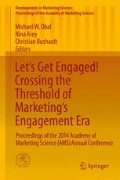Abstract
There is a lack of specific research with a clear consumer orientation regarding the flow state in an online learning environment. Despite the efforts made in recent years to analyze these experiences according to various aspects of a student’s conduct in a virtual learning environment (e.g. Shernoff et al. 2003; Pearce 2005; Choi et al. 2007; Shin 2006; Pace 2007; Liu et al. 2009; Joo et al. 2012), the specific perspective of the consumption behaviour of a student as a consumer of online learning products has not been taken into consideration. Moreover, few studies have been conducted into flow in such environments and most of the findings are inconclusive. This is surprising given that the study of the online flow experience of students (as a consumers) could reveal certain advantages and benefits for students and education centres alike (Pearce et al. 2005; Choi et al. 2007; Ryoo et al. 2008).
Our model extends the previous literature in the understanding of online experiences and specifically the states of flow that emerge in the consumption of higher education learning products. We model the flow phenomenon by identifying the factors that determine its appearance in an online learning environment and the main consequences, and to characterize the consumption process within this context. The theoretical structure presented includes the variables, identified from the literature review, that are likely to be related to flow in these environments. And it includes new relationships that are included between the variables related to flow. Concretely, as a direct antecedents of flow we consider: distortion in the perception of time, focused attention or concentration to the environment from which stimuli originate, perception of control over the medium and interactivity as a particular attribute of the virtual environment. The indirect antecedents we take into account are: attitude of the lecturer to students, learning content available, challenges presented in the online environment, skills of the user and personalization of the environment (a new variable which has not been hitherto considered in any other research into online flow). As consequences of flow we consider: positive affects perceived and student learning. The set of relations put forward in the proposed model are empirically tested.
Access this chapter
Tax calculation will be finalised at checkout
Purchases are for personal use only
Author information
Authors and Affiliations
Corresponding author
Editor information
Editors and Affiliations
Rights and permissions
Copyright information
© 2016 Academy of Marketing Science
About this paper
Cite this paper
Esteban-Millat, I., Martínez-López, F.J., Gázquez-Abad, J.C., Rejón-Guardia, F., Messeger-Artola, A., Rodríguez-Ardura, I. (2016). Students’ Flow Experiences in Virtual Learning Environments: A Consumer Behaviour Perspective. In: Obal, M., Krey, N., Bushardt, C. (eds) Let’s Get Engaged! Crossing the Threshold of Marketing’s Engagement Era. Developments in Marketing Science: Proceedings of the Academy of Marketing Science. Springer, Cham. https://doi.org/10.1007/978-3-319-11815-4_27
Download citation
DOI: https://doi.org/10.1007/978-3-319-11815-4_27
Publisher Name: Springer, Cham
Print ISBN: 978-3-319-11814-7
Online ISBN: 978-3-319-11815-4
eBook Packages: Business and ManagementBusiness and Management (R0)

